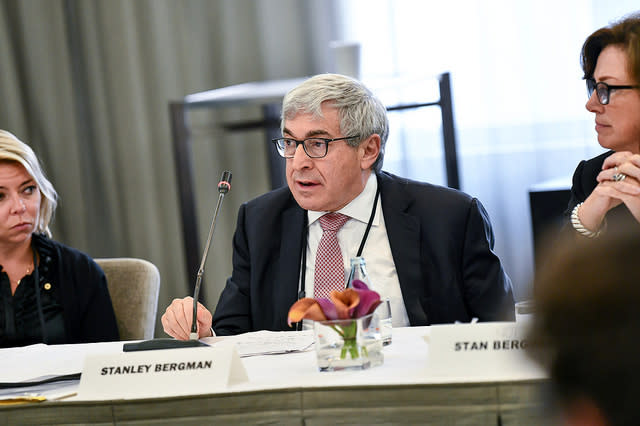CEOs Weigh in on Social Issues and When to Get Political
CEOs are under more pressure than ever to speak out on social issues. But deciding which battles to take on in a highly politicized environment is a constant struggle.
At Fortune's CEO Initiative on Tuesday, executives tackled this question of how and when to engage.
"Leadership is all about trust and authenticity," said Stanley Bergman, chairman and CEO of healthcare products and services company . He added that if you're a trusted and authentic leader, people in your company and business will already tend to know how you think. "If you completely hide how you think," he said, "you will not be trusted and you certainly won't be authentic."
Echoing comments that Delta CEO Ed Bastian made earlier in the day, Bergman said there are clear-cut issues where CEOs should not consult with their boards before they speak out. "It's not a place where the board should tell you what to do," he said. "You either believe in your values or you don't."
He added that CEOs lose the right to govern if they fail to say what they believe in. And if CEOs' values differ from their companies', they "won't be CEOs for long" anyway, he said.
Mikkel Svane, founder and CEO of software company Zendesk, said that in an era where the lines between personal and work life are fuzzy, employees today have "very different expectations about how a company stands on things." He believes CEOs shouldn't always have to speak out on issues, because the company's point of view should already be clear.
Svane takes the approach of empowering employees to take action on the issues they care about. "This is all about employees and building a strong company," he said.
He's also focused on trying to get employees involved and engaged in issues right outside their doors--such as San Francisco's homelessness problem.
Svane gave the example of his own personal project, which is cleaning up the alley behind the company's building--an endeavor that's been surprisingly challenging and given him new perspective. "It's an incredibly humbling experience that I can't even change things in the alley," he said. "So why should I have an opinion on what's going on around the world?"
See original article on Fortune.com
More from Fortune.com
'The Lean Startup' Author Eric Ries Talks About His Long-Term Stock Exchange
'We All Think We're Innovating.' How to Get Your Company to Ship More Than Just Buzzwords
How Weight Watchers and Ford Are 'Redesigning' Their Businesses
'They're Failing Us.' John Doerr Has a Risky Plan for Course-Correcting the Government
Why Corporate Recruiters Shouldn't Be So Obsessed With Prestigious College Degrees


